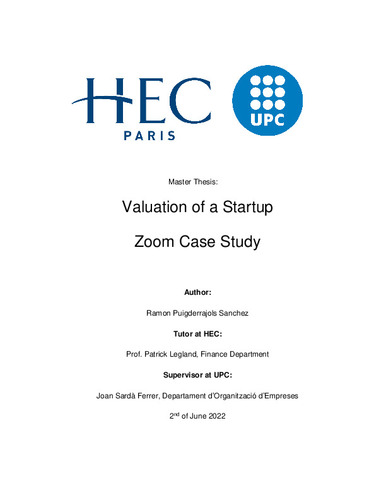Mostra el registre d'ítem simple
Valuation of a Startup: Zoom Case Study
| dc.contributor | Sardà Ferrer, Joan |
| dc.contributor | Legland, Patrick |
| dc.contributor.author | Puigderrajols Sanchez, Ramon |
| dc.contributor.other | Universitat Politècnica de Catalunya. Departament d'Organització d'Empreses |
| dc.date.accessioned | 2022-11-23T12:57:18Z |
| dc.date.available | 2022-11-23T12:57:18Z |
| dc.date.issued | 2022-06-02 |
| dc.identifier.uri | http://hdl.handle.net/2117/376997 |
| dc.description.abstract | This paper provides an overview of the main attributes that define a startup, laying out its stages of development and sources of financing, which are mainly through equity, allowing stakeholders to own part of the business. Also, this paper provides a view on the high-risk nature of a startup, which tends to have operational losses at early stages of development and consequently, high risk of failure. Besides, this research shows that, even though startups operate in any industry, tech and finance are the most successful sectors in the recent years in terms of number of unicorns. The current environment of rising interest rates also affects valuations due to the increase in the risk-free rate, and consequently, the company's cost of capital, which cause valuations to fall. Also, high interest rates increase the interest expense, and thus, companies can spend less money on capital investments, which may affect future earnings growth. The exhaustive company and market analysis of Zoom as of October 2020 shows that Zoom is the clear market leader in the videoconferencing industry, accounting for around 48% of the Daily Active Users in October 2020. This is thanks to the expansion driven by the pandemic lockdowns, which forced people to perform their work-related activities from home. However, competitors in the videoconferencing industry might be able to increase their market share in relation to Zoom since the big incumbent players (e.g., Google Meet, Microsoft Teams etc.) are part of larger corporations which are better capitalized and more skill full when facing a potential future slowdown of the videoconferencing paradigm. The case study of this paper focuses on valuing Zoom on October 2020 using several valuation methodologies. The outcome of the case study provides a share value of between $344.5 and $440.6, which is aligned with the estimations made by several investment banks in that period of time. However, several elements in the case study such as a very high EV/Revenue multiple, indicated that Zoom was overvalued at that time due to the expansion driven by the pandemic lockdowns. |
| dc.language.iso | eng |
| dc.publisher | Universitat Politècnica de Catalunya |
| dc.rights | S'autoritza la difusió de l'obra mitjançant la llicència Creative Commons o similar 'Reconeixement-NoComercial- SenseObraDerivada' |
| dc.subject | Àrees temàtiques de la UPC::Economia i organització d'empreses::Direcció d'operacions |
| dc.subject.lcsh | New business enterprises |
| dc.subject.other | startup |
| dc.subject.other | Zoom |
| dc.subject.other | valuation |
| dc.subject.other | modeling |
| dc.subject.other | finnace |
| dc.title | Valuation of a Startup: Zoom Case Study |
| dc.type | Master thesis |
| dc.subject.lemac | Empreses--Creació |
| dc.identifier.slug | ETSETB-230.170954 |
| dc.rights.access | Open Access |
| dc.date.updated | 2022-10-04T05:50:14Z |
| dc.audience.educationlevel | Màster |
| dc.audience.mediator | Escola Tècnica Superior d'Enginyeria de Telecomunicació de Barcelona |
| dc.audience.degree | MÀSTER UNIVERSITARI EN ENGINYERIA DE TELECOMUNICACIÓ (Pla 2013) |
| dc.contributor.covenantee | HEC Paris |


